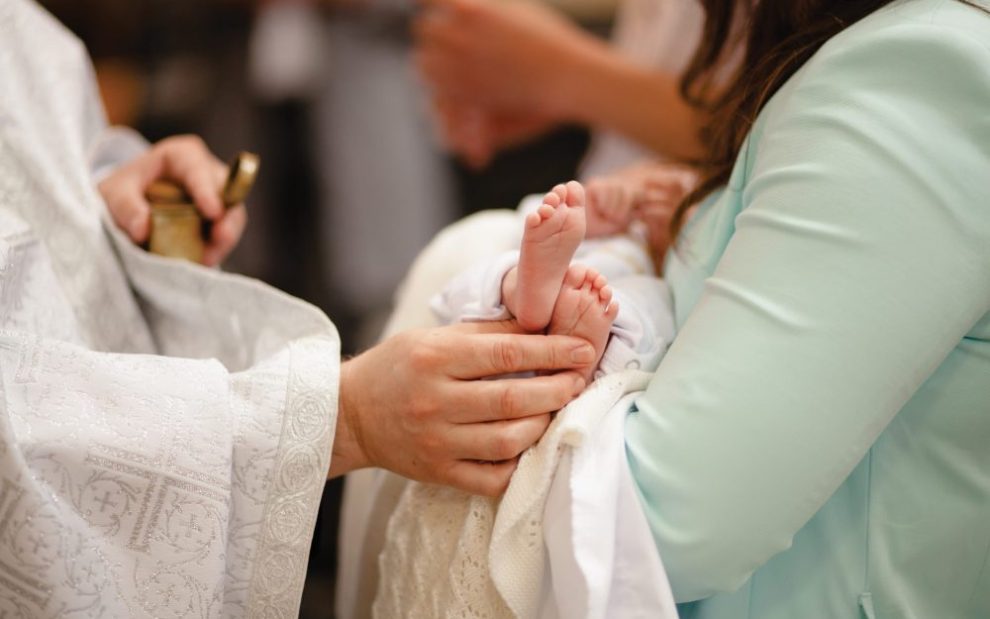I recently became a godmother for the second time in my life, which made me quite nervous. I wasn’t concerned with the part about “being a spiritual mentor”: I think I’m a decent one for the most part. But it was the first time I was asked to be a godmother while having a same-sex partner.
The first challenge was finding a parish that would baptize the baby even though the baby’s parents are not sacramentally married—yes, some parishes are still denying baptism for that reason, despite the fact that the child will be raised Catholic. The second challenge was having a same-sex couple as godmothers.
After knocking on a few doors, I decided to reach out to my spiritual mentor, Father M. In 2010, in high school, I organized my youth group to protest illegal checkpoints targeting undocumented immigrants such as myself. Only one person from my parish showed up, but Father M.’s people were there. That’s how we met.
Father M.’s parish at the time was vibrant, with a high number of registered families. His leadership style is pastoral, he is deeply involved in the community, and I gradually became more involved in his parish. I became a faith-based community organizer there. When I decided to become an immigration attorney, he allowed me to sell donuts and raffle tickets after Masses to fundraise for textbooks.
As “God-incidence” might have it, over 10 years later, Father M. was assigned to the parish where I grew up. Over a short time, he has managed to revive the almost-dead parish thanks to his pastoral style and community involvement. All are welcome there.
After I explained the situation to him and asked whether he would celebrate a baptism with lesbian godmothers, his reply was simple: “Yes! When?” As the iconic late Mexican queer singer and composer Juan Gabriel would say, “Pero qué necesidad, ¿para qué tanto problema?” (“But why is there a need to make it such a problem?”).
On October 31, 2023, the Vatican’s Dicastery for the Doctrine of the Faith issued a response to a letter submitted by a Brazilian bishop “containing some questions about the possible participation in baptism and weddings by transexual persons and homo-affective persons.” While urging pastoral prudence, the document says that trans and gay people may be godparents as well as witnesses to a baptism. It also says that children of a gay couple can be baptized when there is a well-founded hope that the child will be raised Catholic.
If we are honest, most parishioners don’t read these documents, and their religious formation will only grow as much as that of the pastor who leads them. Parishioners looking to grow spiritually and who are not afraid to tackle difficult questions are more likely to leave the church if their pastor is not pastoral—not because of a lack of calling, but because their needs are not being met. However, when they do decide to come back for eventual baptism, I hope they encounter many Father M.’s at their parishes.
As a gift to my goddaughter, I gave her What is God Like?, a lovely children’s book by Rachel Held Evans. Filled with colorful illustrations and beautiful poetry, the book describes God in many ways: “God is like a shepherd, brave and good, a protector who loves her sheep so much that she watches over all of them and knows each of their names by heart.”
It goes on to say, “Whenever you aren’t sure what God is like, think about what makes you feel safe, what makes you feel brave, and what makes you feel loved.” That’s exactly how I feel with Father M. and other brave pastoral priests, deacons, women religious, and lay ministers. They are doing the work of ministry well.
This article also appears in the June 2024 issue of U.S. Catholic (Vol. 89, No. 6, page 9). Click here to subscribe to the magazine.
Image: Shutterstock/Anastasiia Sheptytska














Add comment